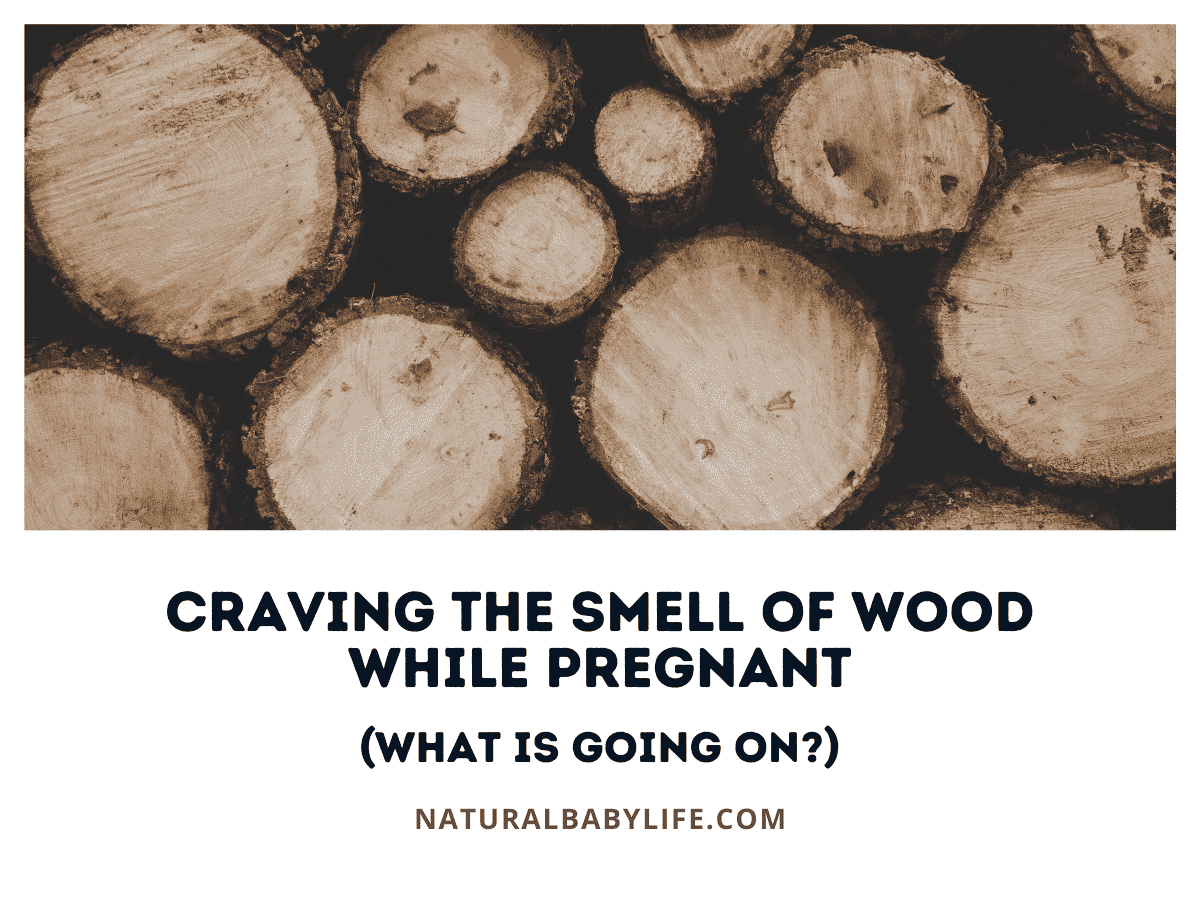Pregnancy causes some strange things to happen to your body and your mind. Cravings are a frequent manifestation of pregnancy. But if you are pregnant and crave certain smells, like wood, you might wonder if what you are experiencing is normal.
Scents can cause a strong emotional response, and cravings for smells including grass, cleaning chemicals, gasoline, and even wood are not unusual for pregnant women. It is typically safe to enjoy the smell of fresh trees (as long as there are no allergies present), but care should be taken with wood shavings, sawdust, lumber, and woody fragrances.
Keep reading for more information on why you might be craving certain smells during pregnancy, including the surprising reasons you might not want to go around sniffing the wood at your local hardware store.
Table of Contents
Is it normal to crave smells during pregnancy?
We all know that food cravings are common during pregnancy, and often with good reason – certain foods provide us with vitamins, protein, carbohydrates, or other nutrients we need. But smell cravings, known as desiderosmia, may be nearly as common, but not nearly as well understood. One research poll found that of 300 pregnant women, 40 had at least one olfactory craving, amounting to 13% of those polled.
Olfactory or smell cravings can be normal for anyone, but they are especially common in pregnant women. The smell is one of the least understood of the human senses, and scientists aren’t sure why some smells are more appealing than others. However, there is some evidence that desiderosmia may be connected to other common pregnancy conditions including pica and iron deficiency.
If you have a strong desire to smell wood during pregnancy, rest assured that there are others like you. While desiderosmia can be perfectly normal, it is important as an expecting mother to be aware of other conditions that might be causing your desire to smell wood.
What is pica during pregnancy?
Pica is a condition in which people have an overwhelming desire to eat non-food items that do not have significant nutritional value. People with iron-deficiency anemia or malnutrition are most at risk of developing pica, followed by pregnant women; however, numbers may be underestimated in pregnancy. Research is limited, but current statistics state that anywhere from about 8% to up to 84% of pregnant women experience some level of pica.
Pica may be associated with olfactory cravings, though sometimes cravings for scents occur outside of pica. Research has not yet fully understood the relationship among pregnancy, scent cravings, and pica; however, we do know for certain that pregnant women are at a higher risk for developing pica.
Some women who have had pica report that their disorder progressed from smell cravings to eating unusual items. Smell and taste cravings in pica may include cravings for:
- ice
- dirt/clay
- hair
- paint chips
- soap/detergent
- cleaning chemicals
- burnt matches or cigarette ashes
Wood, cardboard, sawdust, and woody fragrances may also be common olfactory cravings for pregnant women.
What is desiderosmia during pregnancy?
Some informal polls show that over half of pregnant women have olfactory cravings, but most do not eat non-food items, so smell cravings can exist outside of pica. Research shows that desiderosmia does not always co-occur with pica. In fact, at least half of those who report symptoms of desiderosmia do not have pica, although they do have low iron.
Most experts agree that smell cravings, or desiderosmia, during pregnancy are most often correlated with iron-deficiency anemia. Many pregnant women have low iron while supporting a fetus with increased blood volume, especially during the third trimester, and low iron can cause both food and smell cravings.
If you start noticing increased desiderosmia, or smell cravings, during pregnancy, it may be worth having your blood counts checked. In addition to desiderosmia, iron deficiency may cause:
- Fatigue
- Dizziness
- Shortness of breath
- Rapid heartbeat
- Pale skin
Pregnant women at higher risk for iron deficiency anemia include vegans and vegetarians, women pregnant with multiples, women with quick successive pregnancies, those with severe morning sickness, or women with digestive issues such as celiac or Chron’s disease.
Is smelling wood bad during pregnancy?
We know it could be perfectly normal to crave smells during pregnancy, including wood scents. Of course, as parents we always want to do what is best for our babies – so are there any risks associated with smelling wood?
Environmental odors are any smells found in our environment, including those found in nature. Generally, a person’s reaction to a scent will depend on the intensity of the smell, how long you are exposed to it, how often you are exposed, and your personal sensitivity to it.
Different women crave different types of wood scents, so the answer may vary based on what type of craving you have. Common reactions to environmental odors include headache, congestion, sore throat, and nausea. Here are some specific risks you might experience when smelling these wood scents.
Fresh trees
Trees are commonly associated with allergies – in fact, tree pollen is one of the most common allergens along with grass and weeds.
For pregnant women who have existing allergies, smelling fresh trees to appease a craving might cause sneezing, runny nose, watery eyes, and itching.
Because you may not be able to take your usual allergy medication during pregnancy, it might be wise to avoid this allergen.
Wood shavings or clippings
When working with wood, wood shavings are created, which can release a wonderful scent. Some people also use wood shavings to line the homes of their pet hamsters or rabbits.
Some woods release toxins when they are shaved along with that scent you crave. Irritation similar to allergies may occur, and with prolonged exposure, you may develop a sensitivity to a particular wood.
Lumber
If you are having construction done around your home while you’re pregnant, you may find yourself craving the smell of lumber.
It is important to be aware that particular types of lumber may have substantial off-gassing, in which toxic chemicals such as formaldehyde are released from treated wood into the air.
It is important in this case to limit your exposure by keeping construction areas closed off from the rest of the home.
Cardboard
The smell of cardboard gets even stronger when the cardboard is wet or damp. Unfortunately, this can make cardboard the perfect environment for the growth of mold.
Different varieties of mold can be dangerous for anyone to inhale, including pregnant women. If you love the smell of cardboard, make sure it is clean and dry before smelling it.
Sawdust
People who work in woodworking industries know the risks posed by being exposed to sawdust – side effects might include eye irritation and redness, and with inhalation, the development of asthma and even lung cancer.
If you love the smell of sawdust, it would be wise to let the dust settle and wear a mask so you breathe in the scent only, ensuring you are not inhaling any dust particles.
Woody fragrances
What about woody fragrances, like air fresheners or colognes? Well, most of these items contain synthetic fragrances, which have a variety of health risks, including disrupted hormone activity, and may have fetal risks including neurological disorders, autism, and ADHD.
If you choose to scent your home or like scented body products, look for natural fragrances.
Essential oils
Doctors and scientists recommend avoiding essential oils for the first trimester, as the effects are largely unknown.
However, there are approved essential oils for use during the second and third trimesters. If you are craving a woody scent, it is safe to smell these oils diffused and not inhaled directly:
- Cypress
- Eucalyptus
- Sandalwood
These woody scents, on the other hand, should be avoided throughout pregnancy:
- Birch
- Cedarwood
- Oakwood
- Pine
- Wormwood
Even if it is not a woody scent that you crave, please check a full list of essential oils that are safe and those that should be avoided before using them during pregnancy. When you do choose to use oils during pregnancy, always dilute them and use a small amount for safety.










